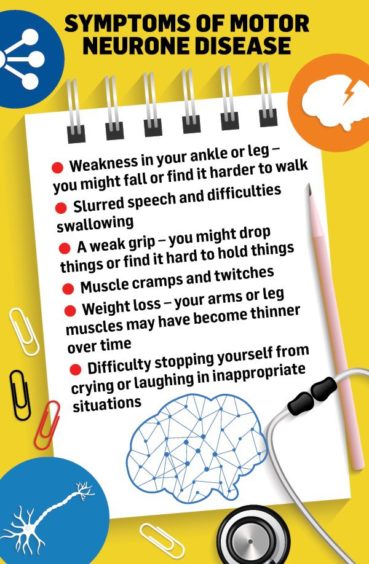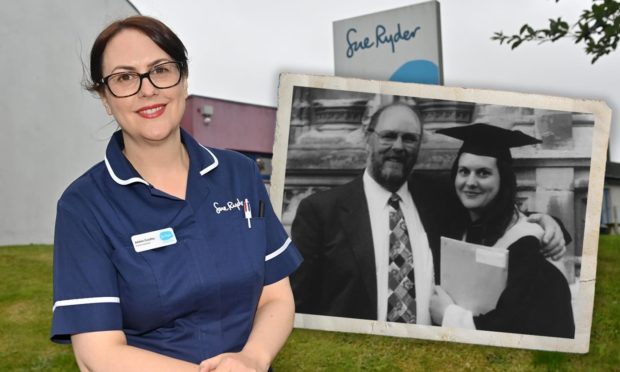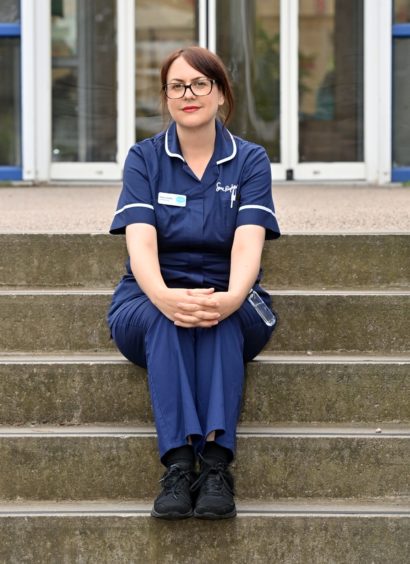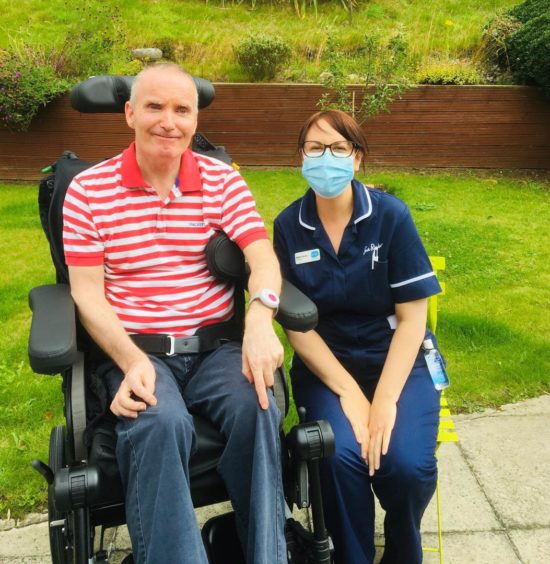When Abbie Coutts’ dad was diagnosed with motor neurone disease she knew he was going to die.
But her family did not expect a struggle with the healthcare system to get the specialist help he needed.
Derek Callon was initially given between two and five years to live with the neurological condition but died within a few months of his diagnosis.
“It is the diagnosis you always dread,” Abbie, of Aberdeen, said. “Unfortunately, he wasn’t able to receive any specialist care and he deteriorated very quickly with the disease, losing his ability to swallow and speak.
“He passed away nine months later and my family were devastated.”
Derek first noticed his speech was slurred when he was teaching a course in forensic science and eventually had to give it up.
But there was no motor neurone disease specialist anywhere near his home.
What care did he struggle to get?
“A lot of the care fell under the Macmillan care nurses and, although they were brilliant, it took a long time to get access to the things he needed,” Abbie said.
“It took a long time to get a wheelchair that was appropriate for him and some of his medications he had to take he needed to swallow, and swallowing was really difficult.
“The disease itself is incredibly cruel so it would have been hard for him.”
Even his care at the Royal Cornwall Hospital left the family feeling frustrated because he was treated in different departments.
Derek. who lived in Cornwall, sadly died at the age of 68 on November 11, 2013.
My dad went through a very cruel nine months in the lead up to his death and I wanted to do something to help ensure this didn’t happen again.
Abbie Coutts
Since then Abbie, who worked as a nurse at Aberdeen Royal Infirmary for 12 years, has been campaigning for improvements in healthcare for seriously ill patients.
Although the mother-of-two stressed it was the healthcare system which let her dad down and not the staff looking after him.
“Being a nurse you’re aware that it’s not the people who are working in the system, it’s the system itself, the barriers and budget constraints that you have,” she said.
“Looking back on his final months it was very clear to the family that there were quite a few issues with the care he received, most stemming from the fact that expert care wasn’t available.”
The 45-year-old nurse gave a series of lectures over the course of a week at the Cornwall hospital following her dad’s death to help improve support for patients.

“My dad went through a very cruel nine months in the lead up to his death and I wanted to do something to help ensure this didn’t happen again,” she said.
Abbie has since given lectures at a palliative care conference in Aberdeen and was also invited to speak at a Manchester Patient Safety Conference.
She believes a Human Factors approach to her dad’s care would have changed many of the issues the family encountered.
This centres on designing a robust system for patient care which plans for when things go right as well as for when things go wrong.
But she said the work of nurses caring for patients was also important.
‘Making sure that my dad had a good death was incredibly important for me’
“A lot of the time we can’t change the outcome,” she said. “As soon as my dad was diagnosed, I knew he was going to die.
“That’s not something that was going to change. Making sure that my dad had a good death was incredibly important for me and definitely for my mum and my family.”
Abbie now works as a practice educator training staff at the Sue Ryder neurological care centre Dee View Court in Aberdeen.
Staff are trained to involve residents in conversations about their care and make sure it is tailored specifically to their needs.
She also introduced daily “safety huddles” at the centre to check on the wellbeing of staff.
Abbie was determined to make changes to healthcare
“My dad and I were incredibly close. I absolutely adored my dad, he was an amazing man,” Abbie said.
“A lot of my determination to do this was seeing the impact this had on my mum; she was his carer 24-hours a day when he was unwell.
“For my mum to see him going through that was just absolutely heartbreaking for her.
“We knew that my dad was going to die but it was so upsetting the fact we didn’t feel that he got the best of care that he could have got at that time.
“I was determined to change that.”
For more information on the Sue Ryder charity or to find out about how to work as a nurse at the Dee View centre visit their website or go to sueryder.org/jobs


